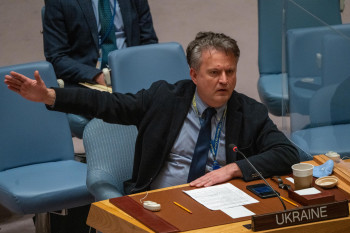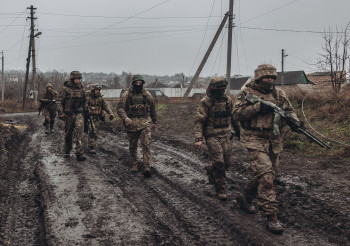Ukraine war latest: Kyiv seeks Russia expelled from UN, aims for peace summit by end of February

Key developments on Dec. 26:
- Foreign Ministry calls on United Nations members to expel Russia
- Ukraine seeks peace summit with UN involvement by end of February
- Over 60% of infrastructure in eastern city of Bakhmut damaged or destroyed.
On Dec. 26, Ukraine called on United Nations member states to expel Russia from the organization and revoke its status as a permanent member of the UN Security Council, according to a statement released by Ukraine’s Foreign Ministry.
The ministry argued that Russia had obtained its membership in the UN and Security Council illegally after the collapse of the Soviet Union, which had been a permanent member of the council.
“Russia has never gone through the legal procedure to be admitted to membership and therefore illegally occupies the seat of the USSR in the UN Security Council…Russia is an usurper of the Soviet Union’s seat in the UN Security Council,” reads the statement.
The Foreign Ministry said that Russia’s actions, such as military aggression against Ukraine, Moldova, Georgia, and Chechnya, are contrary to the concept of a “peace-loving” state, defined in the UN Charter as one of the main criteria for membership.
read also

Peace summit
On the same day, Foreign Minister Dmytro Kuleba said Ukraine is looking to hold a peace summit by the end of February with the involvement of the United Nations and Secretary-General Antonio Guterres.
In an interview with the Associated Press news agency, Kuleba said that Ukraine will do whatever it can to win the war in 2023, adding that diplomacy always plays an important role.
Regarding the summit, the minister stressed that Russia could only be invited to such a gathering if the country faced a war crimes tribunal first.
A plan to initiate a summit to implement the Ukrainian peace formula in 2023 was announced by President Volodymyr Zelensky on Dec. 12.
In mid-November, he presented a 10-point peace plan that envisages preventing ecocide in Ukraine, punishing those responsible for war crimes, withdrawing all Russian troops from the territory of Ukraine, restoration of Ukraine’s territorial integrity, and the release of all prisoners of war and deportees. The proposals also call for ensuring energy security, food security, and nuclear safety.
The Kremlin dismissed the proposal by ruling out withdrawal from Ukraine by the end of 2022. Russian President Vladimir Putin’s spokesperson Dmitry Peskov said on Dec. 13 that Kyiv needs to accept new territorial “realities,” which include Moscow’s illegal claims of “annexation” of four Ukrainian regions – Zaporizhzhia, Donetsk, Luhansk, and Kherson oblasts.
Also on Dec. 26, Putin claimed he was ready to “negotiate with everyone involved in this process about acceptable solutions,” according to the Russian state-controlled news agency TASS.
Both Ukraine and Western allies are skeptical about the Kremlin’s invitations for peace talks.
Ukraine has made it clear that it will not enter into talks with Russia unless the latter returns all occupied territories, including the Crimean Peninsula, which was illegally annexed by Moscow in 2014.
Last week, NATO Secretary General Jens Stoltenberg said the Kremlin’s “invitations to negotiations” only aim to buy Russia time to prepare for a new offensive against Ukraine.
“Russia hopes to freeze the war to allow its forces to regroup, rearm and try to launch a renewed offensive,” he wrote in an op-ed for the Financial Times.
He added that most wars end with peace talks, but “what happens at the negotiating table is inextricably linked with what happens on the battlefield,” thus, Western countries should continue supporting Ukraine.
On the battlefield
Over 60% of the infrastructure in the city of Bakhmut in the eastern Donetsk Oblast, which has been the site of intense fighting, is partially or fully destroyed, Governor Pavlo Kyrylenko said on Dec. 26.
On the same day, Eastern Military Command spokesman Serhiy Cherevaty said that the Bakhmut and Avdiivka areas in Donetsk Oblast remain the sites of the heaviest hostilities at the current stage of the war. He reported that there were 28 episodes of fighting and 225 shellings from artillery and tanks in the Bakhmut area on Dec. 26 alone.
Zelensky described Bakhmut as “the hottest point” out of the entire 1,300-kilometer front line on Dec. 20.
A salt-mine city with a pre-war population of around 70,000 is one of Russia’s main targets, as seizing it could allow Russian forces to launch attacks on urban areas such as Kramatorsk and Sloviansk in Donetsk Oblast.
The General Staff of Ukraine’s Armed Forces said in an evening update on Dec. 26 that Russian troops are trying to improve their tactical positions in the directions of Kupiansk, Avdiivka, and Zaporizhzhia.
In Luhansk Oblast, Ukraine’s Armed Forces are “not far from” the city of Kreminna, and “the fighting is ongoing,” according to Luhansk Oblast Governor Serhii Haidai.
He reported that Ukrainian troops have been stationed within 20 kilometers of the city.
Kreminna lies 25 kilometers northwest of Sievierodonetsk, a major city in Luhansk Oblast which Russian troops occupied in June.
Over the past day, Ukraine’s rocket and artillery forces have hit four control points and six areas of concentration of Russian troops in the past 24 hours, according to the General Staff.
Meanwhile, Russian forces carried out 19 attacks with multiple launch rocket systems, the Ukrainian military said.










